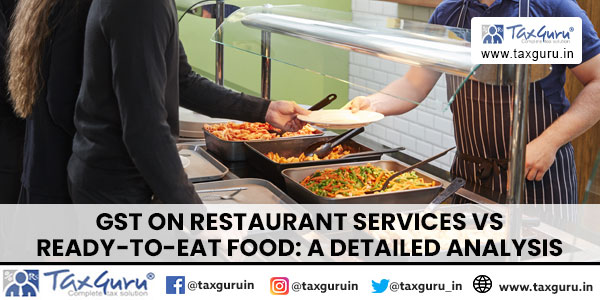GST Applicability on Restaurant Services and Sale of Ready-to-Eat Food: A Detailed Analysis
The Point of Confusion
The classification of food and beverages supplied by restaurants under the Goods and Services Tax (GST) regime has been a subject of debate. A recent advance ruling by the Gujarat Appellate Authority for Advance Ruling (GAAAR) in the case of Riddhi Enterprise has addressed the issue concerning the tax treatment of food prepared and sold in restaurants versus ready-to-eat food items sold over the counter. This article provides a comprehensive analysis of the ruling, its legal references under the CGST Act, 2017, and its implications for businesses operating in the restaurant industry.

Understanding the Scope of Restaurant Services Under GST
As per Notification No. 11/2017 – Central Tax (Rate) dated June 28, 2017, ‘restaurant services’ are classified under SAC 996331. According to this notification, services provided by restaurants, cafes, and similar eating facilities, including takeaway services, room services, and door delivery of food, are subject to GST at 5% without Input Tax Credit (ITC).
Key Definitions and Legal Framework
1. Definition of Restaurant Service: As per Clause (xxxii) of Notification No. 11/2017-CT (R), ‘restaurant service’ refers to the supply of food or beverages by a restaurant, eating joint, mess, or canteen, irrespective of whether the food is consumed on the premises or taken away.
2. Schedule II, Section 7 of CGST Act, 2017: Clause 6(b) states that supply, by way of or as part of any service, of goods such as food or beverages for human consumption shall be treated as a supply of service.
3. Circular No. 164/20/2021-GST dated October 6, 2021: The circular clarifies that restaurant services include dine-in, takeaway, and home delivery services, making them subject to a uniform GST rate of 5%.
Key Findings from the Gujarat AAAR Ruling
The applicant in the case was engaged in a restaurant business, preparing food within the premises and also selling pre-packaged, ready-to-eat food purchased from outside vendors. The two primary issues raised were:
1. Whether food and beverages prepared and supplied by the restaurant (including dine-in, takeaway, and delivery) qualify as ‘restaurant services’ under SAC 996331, attracting GST at 5%.
2. Whether ready-to-eat food and beverages (not prepared in the restaurant but sold over the counter) qualify as ‘restaurant services’ under the same classification.
AAR’s Decision:
- Food prepared and served within the restaurant premises or delivered to customers is classified as ‘restaurant service’ and is subject to 5% GST without ITC.
- However, the sale of ready-to-eat food purchased from third-party vendors and sold over the counter is not a ‘restaurant service.’ Instead, it is considered a supply of goods and is subject to the applicable GST rate for such goods, allowing the supplier to claim ITC.
Judicial Precedents and Interpretations
The AAR ruling referenced multiple judicial decisions:
1. M/s. Kundan Mishthan Bhandar (Uttarakhand AAAR):
-
- The Uttarakhand AAAR held that when goods are supplied to customers in a restaurant or as takeaways from the restaurant counter, they constitute a composite supply where restaurant service is the principal supply.
- However, in the present case, Gujarat AAR distinguished it by highlighting that the applicant was selling food purchased externally, which does not fall under restaurant service.
2. M/s. Gangaur Sweets (Chhattisgarh AAR):
-
- In this case, the AAR ruled that a business running both a restaurant and a sweet shop must classify sales accordingly—prepared food under ‘restaurant service’ and pre-packaged food under ‘supply of goods.’
- Chhattisgarh AAR found that the facts of the case were different and did not align with the applicant’s situation.
Impact on Businesses and Compliance Considerations
- For Restaurants: If a business prepares and serves food on its premises, it will be classified as ‘restaurant service’ and taxed at 5% without ITC.
- For Retail Sales of Pre-Packaged Food: If a restaurant sells pre-packaged food purchased from the market, it will be treated as a ‘supply of goods’ and will attract the applicable GST rate (which could be 12% or 18%, depending on the product), allowing ITC.
- For Hybrid Businesses (e.g., Sweet Shops with Restaurants): Separate invoicing and classification are necessary to ensure compliance. Restaurant sales should be billed under SAC 996331 at 5% GST, while pre-packaged food should be taxed as per the GST rate applicable to goods.
Examples for Better Clarity
1. Case of a Restaurant Selling a Cooked Meal and a Packaged Soft Drink:
-
- The meal is prepared in-house and served to the customer—this is ‘restaurant service’ taxed at 5% GST without ITC.
- The packaged soft drink is sold in its original form—this is a supply of goods and taxed at 18% GST with ITC.
2. Case of a Bakery Selling Freshly Baked Goods and Packaged Cookies:
-
- Freshly baked goods sold within the premises qualify as ‘restaurant service’ at 5% GST.
- Packaged cookies purchased from another manufacturer and resold attract the GST rate applicable to goods (e.g., 12% or 18%).
Conclusion
The Gujarat AAR ruling reinforces the distinction between ‘restaurant services’ and the ‘supply of goods’ in the food industry. Businesses must carefully classify their sales to ensure GST compliance and avoid disputes. While food prepared in-house and served in a restaurant is taxed at 5% as a service, ready-to-eat food sold without any additional service component is considered a supply of goods and taxed accordingly. Proper accounting and documentation are essential to comply with GST regulations and to claim Input Tax Credit where applicable.
References:
- Central Goods and Services Tax Act, 2017
- Notification No. 11/2017-CT (R) dated June 28, 2017
- Circular No. 164/20/2021-GST dated October 6, 2021
- Circular No. 201/13/2023-GST dated August 1, 2023
- Gujarat AAR Ruling dated December 30, 2022





